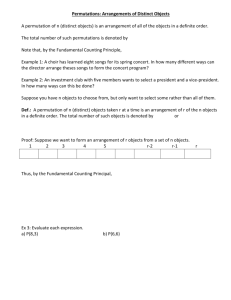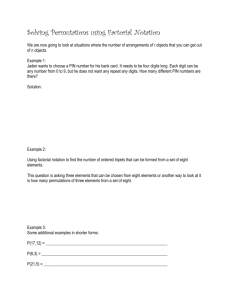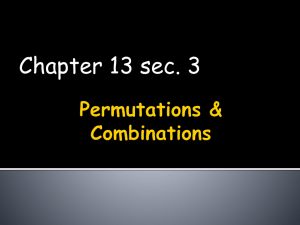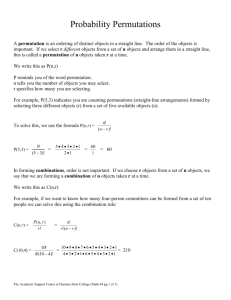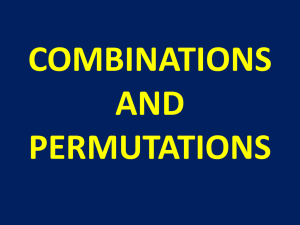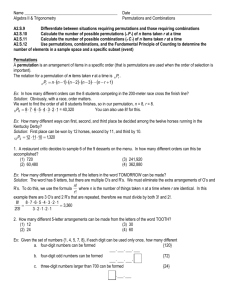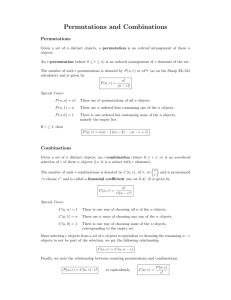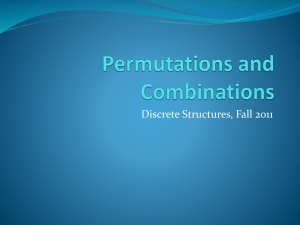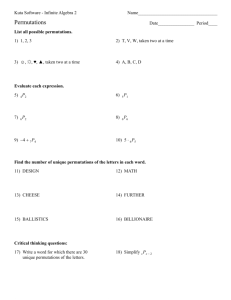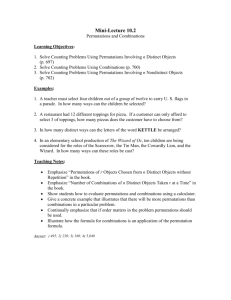Math12 6-2 Solutions
advertisement
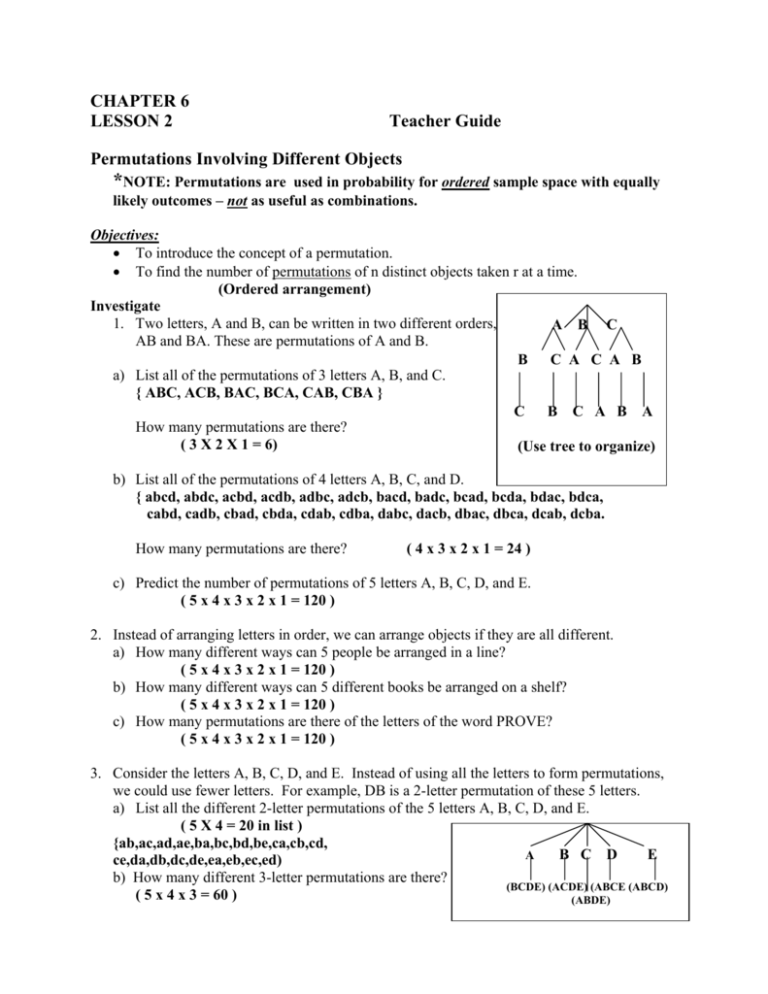
CHAPTER 6
LESSON 2
Teacher Guide
Permutations Involving Different Objects
*NOTE: Permutations are
used in probability for ordered sample space with equally
likely outcomes – not as useful as combinations.
Objectives:
• To introduce the concept of a permutation.
• To find the number of permutations of n distinct objects taken r at a time.
(Ordered arrangement)
Investigate
1. Two letters, A and B, can be written in two different orders,
A B C
AB and BA. These are permutations of A and B.
B
C A C A B
a) List all of the permutations of 3 letters A, B, and C.
{ ABC, ACB, BAC, BCA, CAB, CBA }
C B C A B A
How many permutations are there?
( 3 X 2 X 1 = 6)
(Use tree to organize)
b) List all of the permutations of 4 letters A, B, C, and D.
{ abcd, abdc, acbd, acdb, adbc, adcb, bacd, badc, bcad, bcda, bdac, bdca,
cabd, cadb, cbad, cbda, cdab, cdba, dabc, dacb, dbac, dbca, dcab, dcba.
How many permutations are there?
( 4 x 3 x 2 x 1 = 24 )
c) Predict the number of permutations of 5 letters A, B, C, D, and E.
( 5 x 4 x 3 x 2 x 1 = 120 )
2. Instead of arranging letters in order, we can arrange objects if they are all different.
a) How many different ways can 5 people be arranged in a line?
( 5 x 4 x 3 x 2 x 1 = 120 )
b) How many different ways can 5 different books be arranged on a shelf?
( 5 x 4 x 3 x 2 x 1 = 120 )
c) How many permutations are there of the letters of the word PROVE?
( 5 x 4 x 3 x 2 x 1 = 120 )
3. Consider the letters A, B, C, D, and E. Instead of using all the letters to form permutations,
we could use fewer letters. For example, DB is a 2-letter permutation of these 5 letters.
a) List all the different 2-letter permutations of the 5 letters A, B, C, D, and E.
( 5 X 4 = 20 in list )
{ab,ac,ad,ae,ba,bc,bd,be,ca,cb,cd,
A
B C D
E
ce,da,db,dc,de,ea,eb,ec,ed)
b) How many different 3-letter permutations are there?
(BCDE) (ACDE) (ABCE (ABCD)
( 5 x 4 x 3 = 60 )
(ABDE)
Example 1:
When you press the “scramble” button on a CD player it plays a permutation of the songs on the
CD. If the CD has 5 songs on it, how many permutations of the songs are possible?
( 5 x 4 x 3 x 2 x 1 = 120 )
Example 2:
How many permutations can be formed using all of the letters of the word COMPUTE ?
( 7 x 6 x 5 x 4 x 3 x 2 x 1 = 5040 )
Factorial Notation
1! = 1
2! = 2 x 1 = 2
3! = 3 x 2 x 1 = 6
4! = 4 x 3 x 2 x 1 = 24
5! = 5 x 4 x 3 x 2 x 1 = 120
n! = n (n – 1 ) ( n - 2 ) 1 ( integer n > 1 )
n! = n (n – 1 ) !
(Inductive definition – useful )
Example 3:
How many 3-letter permutations can be formed using the letters of the word COMPUTE?
7
Notation:
7
P3 =
x
6
x
5
= 7! = 210
4!
7! = 7! = The number of Permutations of 7
(7-3) 4!
Distinct objects taken 3 at a time.
Permutations
• An ordered arrangement of distinct objects is called a permutation.
•
The number of permutations of n distinct objects is
•
The number of permutations of n distinct objects taken r at a time is
n!
.
__n__
nPr = (n - r)
Example 4:
Write each expression without using the factorial symbol.
a)
b)
nP2
=
n!
=
(n − 2)!
_n__(n-1) (n-2)! = n (n-1) = n 2 - n
(n-2)!
_(n+2) (n+1) (n) (n-1)! = (n+2) (n+1) (n) = n3 + 3n2 + 2n
(n-1)!
(n + 2)!
=
(n − 1)!
Example 5:
Solve each equation for n.
a) nP2 = 42
or
b)
10Pn
= 90
10! = 90(10-n)
__n!__ = 42
(n-2)!
__10!__ = 90
(10-n)!
__10!__ = (10-n)
90
_n (n-1) (n-2)! = 42
(n-2)!
10 x 9 = 90
n=2
8! = (10-n)
n2 – n – 42 = 0
n = 7, n = -6
7
Definition of 0!
0! =
1
8 = 10-n
reject ^ n =
2=n
What does nPn represent?
# of permutations of objects taken n at a time
Why? So nPn = n! but nPn = __n!__ = _n_ = n!
(n-n)!
To make notation nPn usable
0!
define 0! = 1
